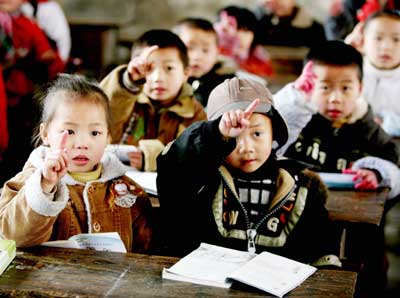|
China to boost spending on education
By Zhao Huanxin (China Daily)
Updated: 2006-03-01 05:40
Spending on education is expected to take up a record 4 per cent of China's
gross domestic product (GDP) during the coming five years, a cabinet official
said yesterday.
In addition to increasing funds to guarantee compulsory education, the
country will lay stress on vocational training for its massive rural migrant
labour, Minister of Education Zhou Ji told a briefing held by the State Council
Information Office in Beijing.

Chinese children
attend a class at a primary school in China's rural Panghai town, Guizhou
Province March 1, 2006. China said spending on education is expected to
take up a record 4 per cent of China's gross domestic product (GDP) during
the coming five years . [Reuters] | "Indeed, China's current expenditure on education, at 2.79 per cent of GDP,
is not very high," Zhou said. "From this year on, the ratio of education
spending will edge up steadily and appreciably."
While the budget is yet to be endorsed by the National People's Congress,
which convenes for its annual session on Sunday, the government has proposed to
apportion at least 218.2 billion yuan (US$26.94 billion) in the 2006-10 period
to ensure every child in rural areas can enjoy nine years of compulsory
education, Zhou said.
China implemented the Compulsory Education Law 20 years ago. Last year,
primary school attendance hit 99.15 per cent, while the gross enrolment for
junior high schools stood at 95 per cent, an increase of 6 percentage points
from 2000, the ministry's statistics show.
But largely because of poverty, the drop-out rate among students under
compulsory education was as high as 5 per cent in the rural areas of seven
provinces in central and western China in 2004, compared with nearly zero in
large- and medium-sized cities, according to ministry sources.
To redress the disparity, the central authorities have decided to scrap
tuition and other fees for primary and junior high school students in western
provinces from the spring semester. The exemption will be extended to central
and eastern provinces by 2007, Zhou said.
To further narrow the educational gap between rural and urban areas, a key
solution is to improve the quality of teachers in the countryside, the minister
said.
Aside from giving incentives such as higher pay, the Compulsory Education
Law, which is being revised, is expected to make it mandatory for urban teachers
to teach for some time in rural areas before they can be promoted, Zhou said.
The minister said China's future economic development hinges on the
improvement of skills and quality of its workforce.
"China has a huge population of 1.3 billion, which will be a heavy burden (to
economic growth) if this population is poorly qualified; but if highly
qualified, the population will deliver a tremendous human-resources advantage,"
Zhou said.
Vocational education for rural migrant workers will be a priority, as they
have already become the main force driving the growth of a host of industries in
China, he said.
Already 140 million farmers have migrated to urban areas to seek their
fortunes, and another 100 million are on the waiting list, according to Zhou.
The ministries of agriculture, labour and finance are launching several
national projects to help train the one-time farmers.
They include a training programme for workers urgently needed for modern
industry and the services sector, plus a project specially designed to train
farmers before and after they move to work in cities, the minister said.
Other highlights of the press conference:
A campaign launched by the government to curb unreasonable school charges,
which are rampant in parts of the country, has resulted in the dismissal of 794
school masters since 2003;
China had 23 million students in its institutions of higher learning by the
end of 2005, the year graduates numbered a record high of 3.38 million;
By 2004, citizens aged 15 and above had received 8.3 years of schooling on
average;
The number of people learning Chinese in other countries and regions has
exceeded 30 million.
(China Daily 03/01/2006 page1)
|